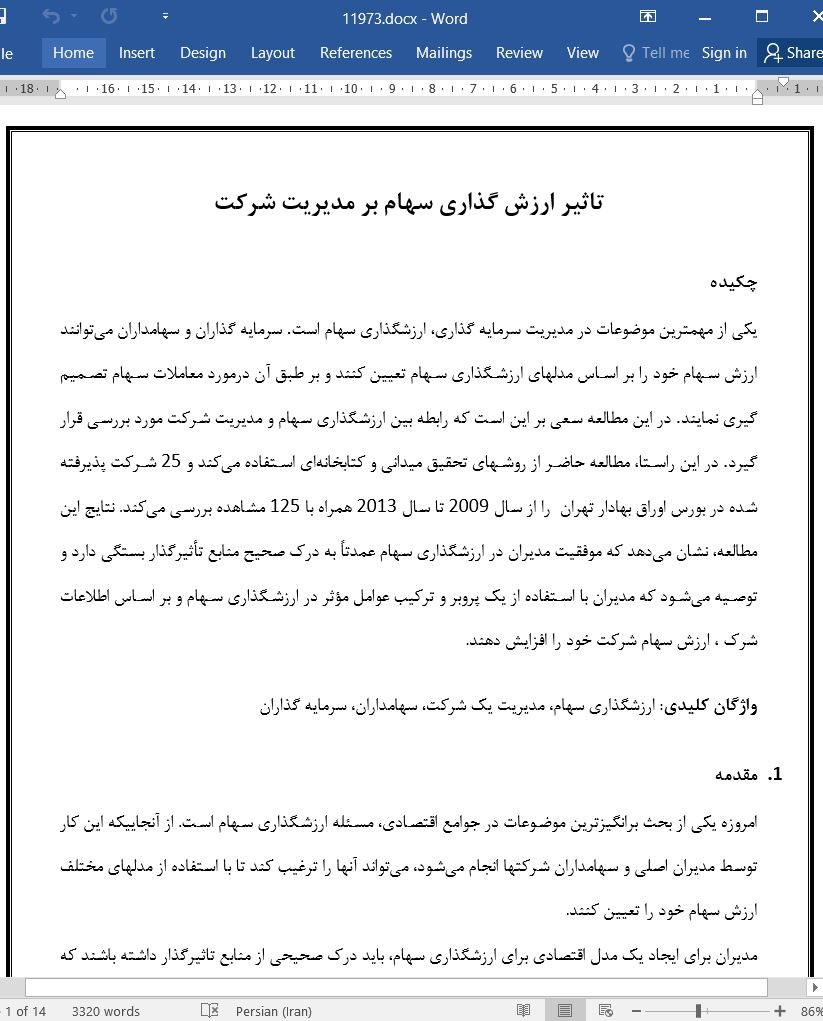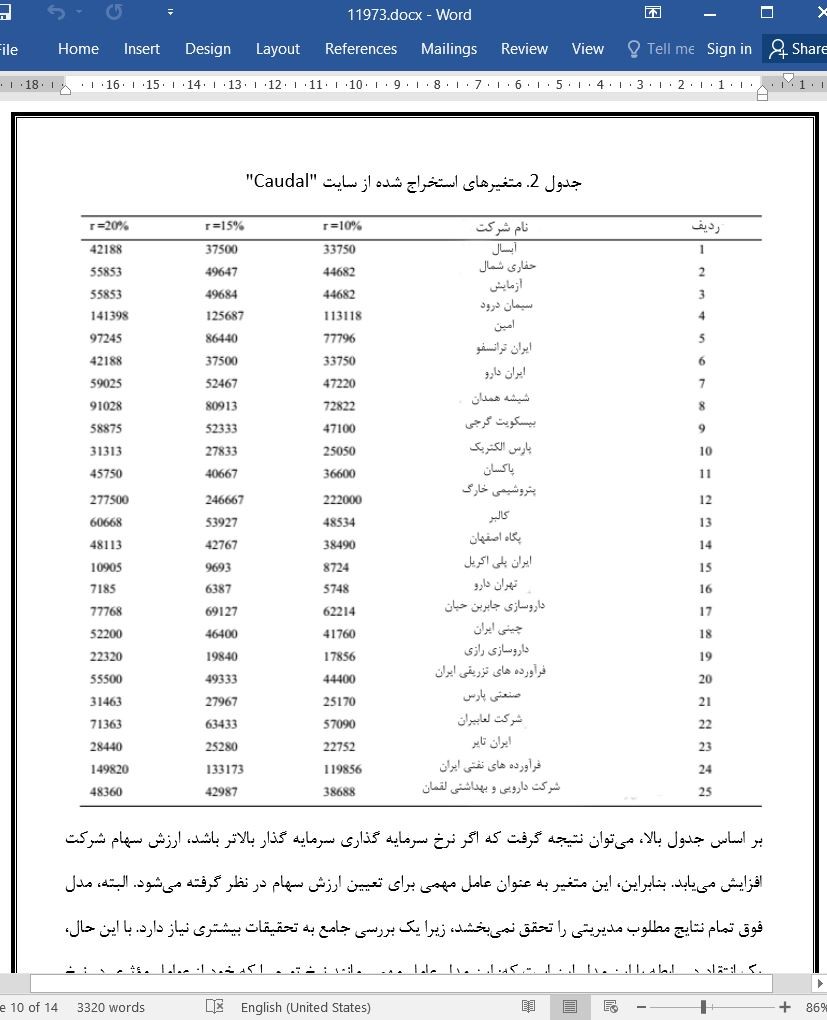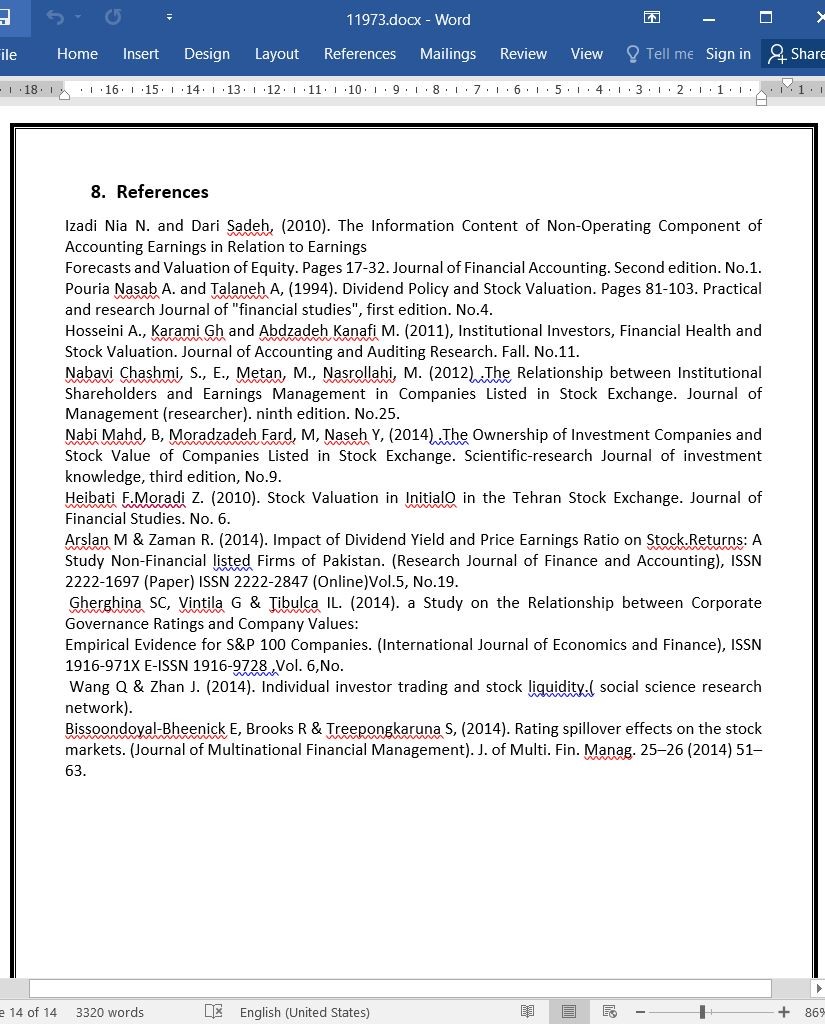
تاثیر ارزش گذاری سهام بر مدیریت شرکت
چکیده
یکی از مهمترین موضوعات در مدیریت سرمایه گذاری، ارزشگذاری سهام است. سرمایه گذاران و سهامداران میتوانند ارزش سهام خود را بر اساس مدلهای ارزشگذاری سهام تعیین کنند و بر طبق آن درمورد معاملات سهام تصمیم گیری نمایند. در این مطالعه سعی بر این است که رابطه بین ارزشگذاری سهام و مدیریت شرکت مورد بررسی قرار گیرد. در این راستا، مطالعه حاضر از روشهای تحقیق میدانی و کتابخانهای استفاده میکند و 25 شرکت پذیرفته شده در بورس اوراق بهادار تهران را از سال 2009 تا سال 2013 همراه با 125 مشاهده بررسی میکند. نتایج این مطالعه، نشان میدهد که موفقیت مدیران در ارزشگذاری سهام عمدتاً به درک صحیح منابع تأثیرگذار بستگی دارد و توصیه میشود که مدیران با استفاده از یک پروبر و ترکیب عوامل مؤثر در ارزشگذاری سهام و بر اساس اطلاعات شرک ، ارزش سهام شرکت خود را افزایش دهند.
1. مقدمه
امروزه یکی از بحث برانگیزترین موضوعات در جوامع اقتصادی، مسئله ارزشگذاری سهام است. از آنجاییکه این کار توسط مدیران اصلی و سهامداران شرکتها انجام میشود، میتواند آنها را ترغیب کند تا با استفاده از مدلهای مختلف ارزش سهام خود را تعیین کنند.
مدیران برای ایجاد یک مدل اقتصادی برای ارزشگذاری سهام، باید درک صحیحی از منابع تاثیرگذار داشته باشند که خود آن عامل مهمی در موفقیت شرکت برای ارزشگذاری سهام است. بنابراین، ابتدا این سؤالات مطرح میشود: "چه نوع رابطهای بین ارزشگذاری سهام و مدیریت شرکت وجود دارد؟"، "آیا منابع بر این رابطه تأثیر میگذارند؟" در این مطالعه، تنها مدلها و نقطه نظرات مطرح شده در سطح نظری با استفاده از صورتهای مالی مورد بحث قرار میگیرند.
7. نتیجه گیری
موضوع ارزشگذاری سهام برای جذب سرمایه گذاران و دستیابی به موفقیت مدیریتی اهمیت زیادی دارد، زیرا آنها میتوانند ارزش سهام خود را بر اساس مدلهای پیشنهادی در ارزشگذاری سهام تعیین کنند و در مورد معامله آن تصمیماتی را اتخاذ کنند. این مقاله، مدلهای ارزیابی Gordon و Walter را مورد بررسی قرار داده است. بررسی این مدلها حاکی از آن است که شرایط صنعت، شرکت، عرضه و تقاضا برای محصولات شرکت، بازار داخلی و جهانی، بهره وری ناشی از فعالیتهای مالی جاری شرکت، فن آوری و عمر شرکت، قیمتگذاری محصولات جدید، وضعیت رقابتی و ریسک پذیری شرکت را باید در ارزشگذاری مورد توجه قرار داد. با این حال، هر یک از این مدلهای کنونی، داری معایب و اشکالاتی است، بنابراین نمیتوان با اطمینان 100% از آنها استفاده کرد، زیرا برخی از عوامل پنهان متغیر مثل عوامل اقتصادی (تورم) وجود دارند که در این مدلها بررسی نشدهاند. بر اساس مسائل نظری مربوط به عوامل مؤثر بر ارزشگذاری سهام،
Abstract
One of the most significant issues in investment management is stock valuation. Investors and shareholders can value their own shares based on stock valuation models and make decisions on stock trading accordingly. This study attempts to examine the relationship between stock valuation and a company's management. In this regard, the present study uses field and library research methods, and examines 25 companies listed in Tehran Stock Exchange from the years 2009 to 2013 along with 125 observations. The results of this study suggest that managers’ success in stock valuation primarily depends on the correct understanding of influential resources and it is recommended that managers increase the value of their company’s stock by the prober use and combination of factors effective in stock valuation according to the information of the company.
1. Introduction
Today, one of the most controversial issues in economic communities is the issue of stock valuation. Since it is carried out by major managers and shareholders of companies, it motivates them to conduct stock valuation with different types of models.
In order to develop an economic model for stock valuation, managers should have a correct understanding of the influential resources which itself is a key factor in a company’s success in stock valuation. Therefore, these questions arise first: “what kind of relationship is there between stock valuation and corporate management?” “Is this relationship influenced by the resources?” In this study, only the models and viewpoints raised at the level of theory are discussed using financial statements.
7. Conclusion
The issue of stock valuation for attracting investors and achieving management success is of great importance since they can value their stock based on the proposed models in stock valuation and make decisions on its trading. In this article, the valuation models of Gordon and Walter have been examined. The investigation of these models indicate that the conditions of industry, company, supply and demand for the company's products, domestic and global market, the productivity achieved by the current financial activities of company ,technology, and company’s life, new product pricing, competitive status and company’s risk-taking in valuation should be taken into account. However, each of these current model has some shortcomings and drawbacks, therefore, they cannot be used with 100% confidence level because there are some varying hidden factors such as economic factors (inflation) which have not been investigated in these models. According to the theoretical issues in the factors affecting stock valuation,
چکیده
1. مقدمه
2. بررسی مقالات
3. روش تحقیق
3.1. ابزارهای جمع آوری دادهها
4. مبنای نظری
4.1. اهداف فرایند ارزشگذاری
4.2. عوامل تاثیرگذار بر ارزشگذاری سهام
4.3. انواع مدلهای ارزشگذاری سهام
5. مدل Gordon
6. مدل Walter
7. نتیجه گیری
8. منابع
Abstract
1. Introduction
2. Review of Literature
3. Research Methodology
3.1. Data Collection Tools
4. Theoretical Foundations
4.1. The Goals of Valuation Process
4.2. Factors Influencing Stock Valuation
4.3. Types of Stock Valuation Models
5. Gordon Model
6. Walter Model
7. Conclusion
8. References
- اصل مقاله انگلیسی با فرمت ورد (word) با قابلیت ویرایش
- ترجمه فارسی مقاله با فرمت ورد (word) با قابلیت ویرایش، بدون آرم سایت ای ترجمه
- ترجمه فارسی مقاله با فرمت pdf، بدون آرم سایت ای ترجمه



